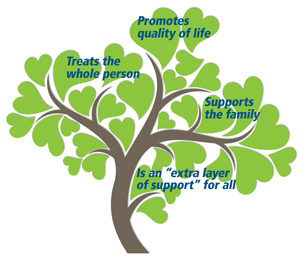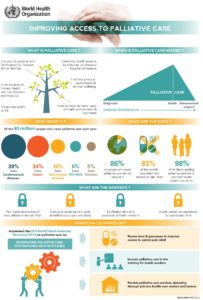WHO definition of Palliative Care

“Palliative care is an approach that improves the quality of life of patients and their families facing the problem associated with life-threatening illness, through the prevention and relief of suffering by means of early identification and impeccable assessment and treatment of pain and other problems, physical, psychosocial and spiritual”.
Principles of Palliative Care
Palliative care:
- provides relief from pain and other distressing symptoms;
- affirms life and regards dying as a normal process;
- intends neither to hasten or postpone death;
- integrates the psychological and spiritual aspects of patient care;
- offers a support system to help patients live as actively as possible until death;
- offers a support system to help the family cope during the patients illness and in their own bereavement;
- uses a team approach to address the needs of patients and their families, including bereavement counselling, if indicated;
- will enhance quality of life, and may also positively influence the course of illness;
- is applicable early in the course of illness, in conjunction with other therapies that are intended to prolong life, such as chemotherapy or radiation therapy, and includes those investigations needed to better understand and manage distressing clinical complications.
Essential Components of Palliative Care
- Control of symptoms
- Effective communication
- Rehabilitation
- Continuity of care
- Terminal care
- Support in bereavement
- Education
- Research
Three forms of Palliative Care
1. A palliative approach
2. Specialised palliative service provision
3. End of life (terminal) care
Click here to know more about the three forms.
Key Messages
• Palliative care focuses on ‘quality of life and comfort care’ rather than on ‘cure’.
• Palliative care addresses the physical, psychosocial and spiritual needs of individuals with advanced life-limiting illnesses and their families.
• Careworkers play a key role in palliative care through the comfort care and support that they provide to residents and families.
• It’s important to distinguish between three forms of palliative care: – A palliative approach – Specialised palliative service provision – End of life (terminal) care
When to initiate Palliative Care
Palliative care may be given at any time during a person’s illness, from diagnosis on.
A wide variety of patients can benefit from palliative care including:
- those who have been diagnosed with a complex, serious illness who desire relief from pain or symptoms associated with the disease;
- those who need to make difficult decisions about how to proceed with care and treatment; and
- those who need assistance with communication issues related to care and treatment can all benefit from palliative care.
The goal of palliative care is achievement of the best quality of life for patients and their families. Individuals seeking palliative care may have a prognosis beyond six months and may continue to pursue cure-oriented treatment while receiving palliative care services. This approach is intended to allow people with a life-threatening illness earlier access to the same type of care that hospice patients receive.
Palliative Care in brief:
Reference
1. CareSearch 2018. ‘Introduction to a Palliative Approach: Educational Flipchart’, viewed 20 June 2018, <https://www.caresearch.com.au/Caresearch/Portals/0/PA-Tookit/Educational_Flipchart_Introduction_to_a_Palliative_Approach_1.pdf>
2. CareSearch 2018. ‘What is a Palliative Approach?’, viewed 20 June 2018, <https://www.caresearch.com.au/caresearch/Portals/0/PA-Tookit/Resources_2016_Update/Fact_Sheet_6_What_is_a_Palliative_Approach.pdf>
3. Start the conversation 2018. ‘When to begin palliative care?’, viewed 20 June 2018, <http://www.starttheconversationvt.org/palliative-care-hospice/palliative-care/when-to-begin-palliative-care>

